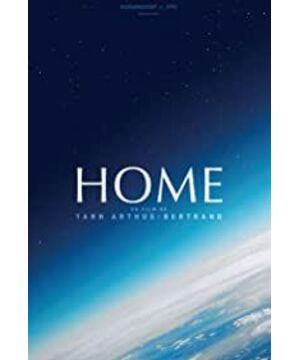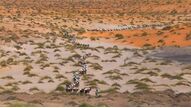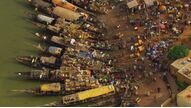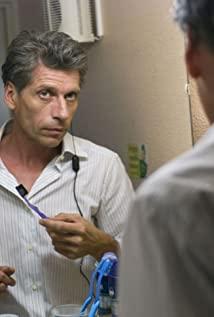In the past 50 years, the world’s population has more than doubled. At the same time, we put our own islands ——The earth has undergone more fundamental changes than in the past 200,000 years.
In only 50 years, the earth has changed, which has never been experienced by humans in history. Faster and faster...
Oil brings unprecedented comfort to mankind. 1 liter of oil = 100 energy produced by hands in a day. The grain produced by three million farmers in the United States can feed two billion people. And these grains are not supplied to the population, most of which are used to feed livestock. These animals may not have seen the grassland in their lifetime. Teams of trucks transported tons of grains, soybeans and rich protein pellets, which eventually turned into piles of meat.
Faster and faster, the distance is not measured in kilometers, but in how many minutes drive, the car has become a symbol of comfort and progress. If every society follows this model, the earth will not only have 900 million, but 5 billion.
Since 1950, the world’s population has doubled, and the annual fish catch has increased from 18 million tons to 100 million tons. Maybe a certain fish species you eat in a high-end restaurant one day may be the last one in the world.
For every ten large rivers on the earth, one cannot flow out of the sea for several months of the year. Without water from the Jordan River, the level of the Dead Sea is reduced by one meter per year. India may be the country most affected by water scarcity in the next century. In the past two decades, they have dug 21 million wells. In order to find water sources, the wells have been dug deeper and deeper. In Western India, 30% of the wells have been abandoned and underground aquifers. It began to dry up.
Before 2025, water scarcity will affect 2 billion people.
Since 1960, the rate of logging has been increasing. Amazonia is the largest tropical rain forest in the world. Its area has shrunk by 20%. The forest has been given over to cattle farms and soybean fields.
Borneo, once the cradle of the world’s largest biological species, has now been broken. The disaster stems from the production of the world’s highest-selling palm oil. It is not only edible, but can also produce cosmetics, detergents, and even more and more popular alternative fuels. The diversity of trees is replaced by simplification.
Another excess is eucalyptus for making pulp. The demand for paper has increased fivefold in the past 50 years. The bottom of the eucalyptus has no grass. The fallen leaves are poisonous and prevent other plants from growing. They grow fast and consume a lot of water.
Trees provide habitat for three quarters of biological species. We have repeatedly destroyed it. More than two billion people in the world depend on charcoal.
The disparity between the rich and the poor has never been so severe in 50 years. Today, half of the world's wealth is in the hands of 2% of the rich. This disproportionation leads to population migration. The population of Lagos was only 700,000 in 1960 and will increase to 16 million by 2025.
In the past 40 years, the thickness of the ice cap has been reduced by 40%. Its area in the summer has been declining year by year, and it will all disappear in 2030. Another argument is 2015. On the surface of Greenland, lakes have begun to form, and even the most pessimistic scientists could not predict the rate of melting a decade ago.
global warming. In severe cold areas such as Siberia, the ground has been frozen for a long time, called a permafrost zone, and hidden underneath is a climate time bomb, biogas. The concentration of this greenhouse gas is twenty times stronger than that of carbon dioxide, and the released biogas will worsen the greenhouse effect to an unpredictable level.
Faster and faster... The
global expenditure on armaments is twenty times that of aid to developing countries. In
2050, one quarter of the earth’s organisms are endangered, and the mortality rate of biological species is 1,000 times faster than normal
. There are 5 human causes every day. One
billion people died from drinking contaminated water. One billion people were struggling on the brink of starvation.
Half of the world’s grains are used for feed and fuel.
Forty percent of the world’s arable land is declining.
Every year 13 million hectares of forest disappear. The
last 15 years are the hottest on record.
We got the earth’s four billion-year legacy, but it only took 200,000 years to change its appearance.
Human beings have only ten years to reverse the direction of warming. We have concocted phenomena that we can't control. We have very little time to make changes.
To save the earth, start with the things around you and
use the reverse side of the paper. When the fountain pen is used up, you can just change the refill, and use less disposable items. At the same time, it supports environmental protection work. Do not throw garbage. If you have books and clean clothes to throw away at home, you can organize them and send them to poor places.
Save water, don't waste it.
If you don’t need a car to travel, don’t buy a car for the time being, because it consumes a lot of gasoline and pollutes the air. Maybe the solar car will be invented in the near future, and it will cost a lot of money to replace it at that time.
If possible, plant one tree every year and plant different species. Don't let our trees be replaced by palm trees and eucalyptus.
Recommend friends around you to watch this film and educate the next generation to be environmentally conscious.
There are many, many, everyone can start with the small things around...
????
1. How to maximize the development of the sun's energy. The energy emitted by the sun in 60 minutes is equivalent to human consumption in one year;
2. Recycling resources? The simplest paper, in China, the work of recycling is the hardest. Existing resource recycling companies in China recycle foreign "waste".
View more about Home reviews









